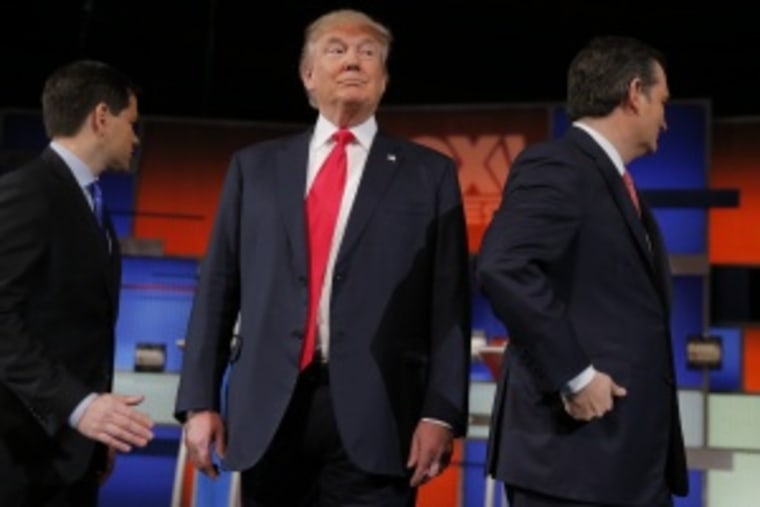Donald Trump, the candidate who has shunned large donations and a “corrupt” campaign finance system is quickly gearing up for a general election race by doing the exact things he derided during the primary. And the large donors that traditionally bank roll Republican candidates are divided on their support of the likely Republican nominee.
In what is expected to be a $2 billion dollar race, Trump’s efforts at keeping fundraising parity with his likely Democratic opponent, Hillary Clinton, might be difficult to meet.
Some of the most prolific Republican donors have said they’d stay out of the presidential race, potentially depriving Trump of tens of tens of millions of dollars.
Charles and David Koch plan to stay out of the presidential race now that Trump is the nominee. Their donor network had budgeted more than $250 million to spend in 2016, including on the presidential race. But now that Trump is the nominee, the organization will spend that money on key Senate and Congressional races as well as their issue-based campaigns in three dozen states.
While the Kochs are the highest profile Republican donors, they aren’t the only ones who are willing to spend millions of dollars in presidential politics, who plan to sit on the sidelines.
Another loss to the Republican likely nominee is Paul Singer, a New York-based hedge fund manager who gave $5 million to the super PAC backing Florida Sen. Marco Rubio’s presidential effort and another $1.5 million to the stop Trump movement, won’t financially support Trump in the general election.
Related: Meet the Republicans Speaking Out Against Trump
It's unclear if anti-Trump donors Joe and Marlene Ricketts, billionaires who spent more than $13 million in 2012 trying to defeat President Barack Obama will back Trump. The Ricketts' spokesperson did not respond to questions about the Ricketts' intentions.
If the Ricketts do decide to back Trump, it would be a major shift for the Chicago Cubs owners. They spent at least $5.5 million trying to defeat him through the stop Trump effort, and Marlene Ricketts was the first major funder of the anti-Trump group, Our Principles PAC.
Their son, Pete Ricketts, the governor of Nebraska, will endorse Trump and will appear with him at a Nebraska event Friday, according to the Wall Street Journal.
Despite some major donors sitting this presidential primary out, Trump is working to build a national fundraising operation. He now says he will now accept “small donations,” without defining small. He also hired a campaign finance director Thursday. He reached a joint fundraising agreement with the Republican National Committee. And he has not denounced the super PAC backing him that has been staffing up.
Trump’s hiring of Steven Mnuchin to be his chief fundraiser, is a significant move but might not win over donors skeptical of Trump’s conservative bona fides.
Mnuchin, a former Goldman Sachs partner, has been an active political donor – mostly to Democrats. He has contributed to the presidential campaigns of Democrats Barack Obama, Hillary Clinton, John Edwards, Bill Richardson and John Kerry. In fact, of the $100,000 he’s contributed outside of the political action committee run by Goldman Sachs, only $33,000, or 33 percent, has been given to Republican candidates, according to data compiled by the Center for Responsive Politics.
Some donors and traditional bundlers still need some persuading, but are open to listening.
“Trump has a ways to go before he earns my support, but he’s getting better,” David Beightol, who was a backer of Jeb Bush this election cycle and then Ohio Gov. John Kasich.
Related: Could Donald Trump be a Financial Liability For the Republican Party?
It’s not all bad news for Trump. Some Republican donors who refused to engage in the primary or backed other candidates in the primary are willing to get behind the candidate.
Sheldon Adelson, the Las Vegas casino magnate who gave $100 million dollars to Republican candidates in 2012, told the New York Times that he will back Trump. "Yes, I'm a Republican. He's a Republican," Adelson said Thursday night.
And Bob Grand, a bundler for 2012 Republican nominee Mitt Romney, who did not get involved in the primary, said he’s going to back Trump.
“He’s our Republican nominee,” he said Thursday. “We have to beat Hillary Clinton.”
Another, Fred Malek, longtime Republican donor who has worked for four Republican presidents, also sat out the primary. But now that Trump is the likely nominee, said, “I will support the nominee of my party.”

